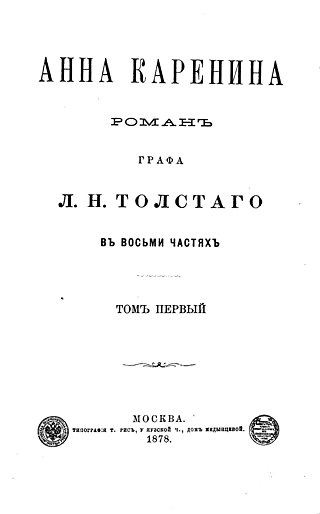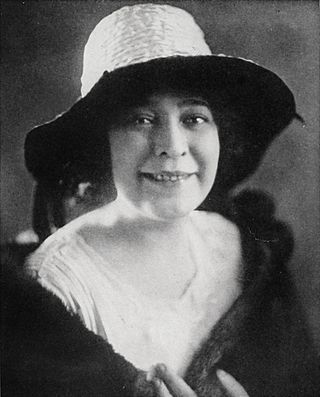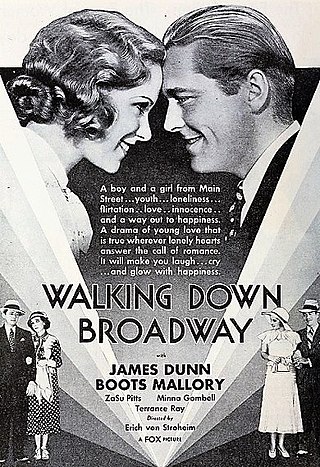
Die Fledermaus is an operetta composed by Johann Strauss II to a German libretto by Karl Haffner and Richard Genée, which premiered in 1874.

Anna Karenina is a novel by the Russian author Leo Tolstoy, first published in book form in 1878. Considered to be one of the greatest works of literature ever written, Tolstoy himself called it his first true novel. It was initially released in serial installments from 1875 to 1877, all but the last part appearing in the periodical The Russian Messenger. When William Faulkner was asked to list what he thought were the three greatest novels, he replied: "Anna Karenina, Anna Karenina, and Anna Karenina".

George Balanchine was an American ballet choreographer of Georgian origin, recognized as one of the most influential choreographers of the 20th-century. Styled as the father of American ballet, he co-founded the New York City Ballet and remained its artistic director for more than 35 years. His choreography is characterized by plotless ballets with minimal costume and décor, performed to classical and neoclassical music.

Coppélia is a comic ballet from 1870 originally choreographed by Arthur Saint-Léon to the music of Léo Delibes, with libretto by Charles-Louis-Étienne Nuitter. Nuitter's libretto and mise-en-scène was based upon E. T. A. Hoffmann's short story Der Sandmann. In Greek, κοπέλα means young woman. Coppélia premiered on 25 May 1870 at the Théâtre Impérial de l'Opéra, with the 16-year-old Giuseppina Bozzacchi in the principal role of Swanhilda and ballerina Eugénie Fiocre playing the part of Frantz en travesti. The costumes were designed by Paul Lormier and Alfred Albert, the scenery by Charles-Antoine Cambon, and Édouard Desplechin and Jean-Baptiste Lavastre.

Vera Zorina, born Eva Brigitta Hartwig, was a Norwegian ballerina, theatre and film actress, and choreographer. Today, she is chiefly remembered for her films choreographed by her then-husband George Balanchine. They include the Slaughter on Tenth Avenue sequence from On Your Toes, The Goldwyn Follies, I Was an Adventuress with Erich Von Stroheim and Peter Lorre, Louisiana Purchase with Bob Hope, and dancing to "That Old Black Magic" in Paramount Pictures' Star Spangled Rhythm.

Mary Loretta Philbin was an American film actress of the silent film era, who played Christine Daaé in the 1925 film The Phantom of the Opera opposite Lon Chaney, and Dea in The Man Who Laughs alongside Conrad Veidt.

June Mathis was an American screenwriter. Mathis was the first female executive for Metro/MGM and at only 35, she was the highest paid executive in Hollywood. In 1926 she was voted the third most influential woman in Hollywood, behind Mary Pickford and Norma Talmadge. Mathis is best remembered for discovering Rudolph Valentino and writing such films as The Four Horsemen of the Apocalypse (1921), and Blood and Sand (1922).

The Great Gabbo is a 1929 American Pre-Code early sound musical drama film directed by James Cruze, based on Ben Hecht's 1928 short story "The Rival Dummy", and starring Erich von Stroheim and Betty Compson. The film features songs by Lynn Cowan, Paul Titsworth, Donald McNamee and King Zany.

Five Graves to Cairo is a 1943 war film directed by Billy Wilder and starring Franchot Tone and Anne Baxter. Set in World War II, it is one of a number of films based on Lajos Bíró's 1917 play Hotel Imperial: Színmű négy felvonásban, including the 1927 film Hotel Imperial. Erich von Stroheim portrays Field Marshal Erwin Rommel in a supporting performance.

Albert De Conti Cadassamare, professionally billed as Albert Conti, was an Austrian-Hungarian-born Italian-American film actor.

On the Town is a 1949 American Technicolor musical film with music by Leonard Bernstein and Roger Edens and book and lyrics by Betty Comden and Adolph Green. It is an adaptation of the Broadway stage musical of the same name produced in 1944, although many changes in the script and score were made to the original stage version; for instance, most of Bernstein's score was dropped in favor of new songs by Edens, who felt that the majority of Bernstein's music was too complex and too operatic for film audiences. This caused Bernstein to boycott the film.

Merry-Go-Round is a 1923 American feature film directed by Erich von Stroheim (uncredited) and Rupert Julian, starring Norman Kerry and Mary Philbin, and released by Universal Pictures. A copy of the film is held in a collection and it has been released on DVD.

The Frozen North is a 1922 American short comedy film directed by and starring Buster Keaton. The film is a parody of early western films, especially those of William S. Hart. The film was written by Keaton and Edward F. Cline. The film runs for around 17 minutes. Sybil Seely and Bonnie Hill co-star in the film.

Neptune's Daughter is a 1949 American Technicolor musical romantic comedy film released by Metro-Goldwyn-Mayer starring Esther Williams, Red Skelton, Ricardo Montalbán, Betty Garrett, Keenan Wynn, Xavier Cugat and Mel Blanc. It was directed by Edward Buzzell, and features the debut of the Academy Award–winning song "Baby, It's Cold Outside" by Frank Loesser.

Foolish Wives is a 1922 American erotic silent drama film produced and distributed by Universal Pictures under their Super-Jewel banner and written and directed by Erich von Stroheim. The drama features von Stroheim, Rudolph Christians, Miss DuPont, Maude George, and others.

The Emperor's Candlesticks is a 1937 historical drama film starring William Powell and Luise Rainer and directed by George Fitzmaurice. It is based on the 1899 novel of the same name by Baroness Orczy. The story follows the adventures of spies from opposing sides who fall in love while following the eponymous candlesticks—and the papers hidden inside them—all over turn-of-the-20th-century Europe.

Hello, Sister! is a 1933 American pre-Code drama-romance film produced by Fox Film Corporation. It was directed by Erich von Stroheim, Raoul Walsh, Alfred L. Werker, and Edwin Burke, although none of those directors are credited. The film is a re-edited version of von Stroheim's now-lost film Walking Down Broadway.

The Lost Squadron is a 1932 American pre-Code drama, action, film starring Richard Dix, Mary Astor, and Robert Armstrong, with Erich von Stroheim and Joel McCrea in supporting roles, and released by RKO Radio Pictures. Based on the novel The Lost Squadron (1932) by Dick Grace, the film is about three World War I pilots who find jobs after the war as Hollywood stunt fliers.

Ernő Verebes was a Hungarian-American actor who began his career in Hungarian silent films in 1915. During his film career he worked and lived in Hungary, Germany and in the United States. He was born into a Hungarian emigrant family in New York, but his family later returned to Austria-Hungary.

Jack Whiting was an American actor, singer and dancer whose career ran from the early 1920s through the late 1950s, playing leading men or major supporting figures.




















